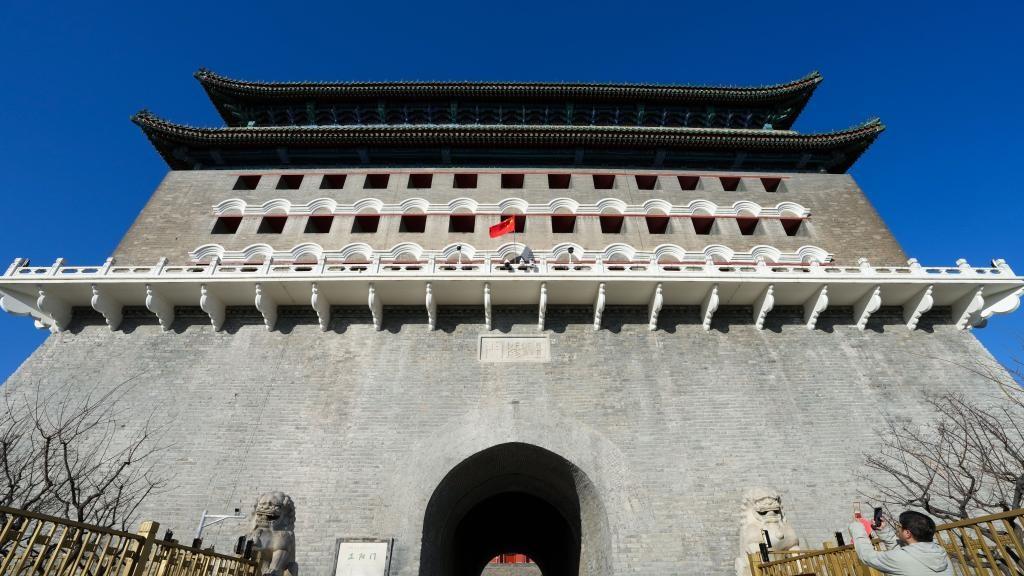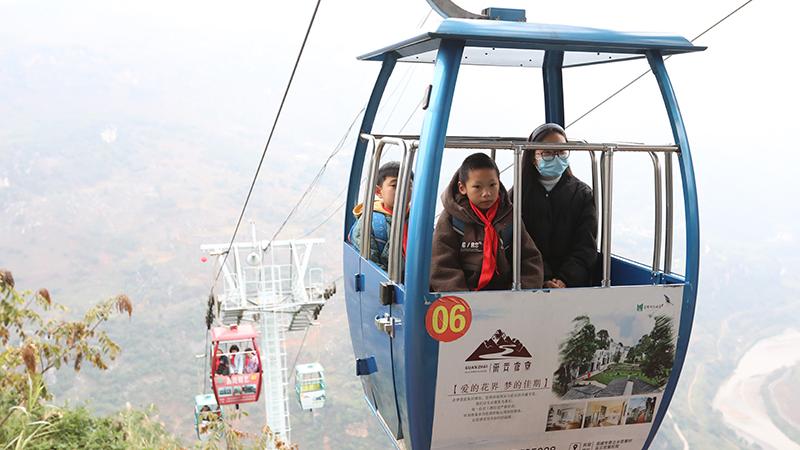Xiplomacy: Xi's letters add dynamism to China's global exchanges
BEIJING, Dec. 27 (Xinhua) -- "The reply from President Xi was the greatest surprise of the year to me," said Humphrey Moshi, director of the Center for Chinese Studies at the University of Dar es Salaam in Tanzania.
Moshi is one of the 63 scholars from 50 African countries who received a reply from Chinese President Xi Jinping in late August ahead of the Forum on China-Africa Cooperation (FOCAC) Beijing Summit. Prior to that, they wrote a joint letter to Xi, in which they extended their warm congratulations on the successful conclusion of the third plenary session of the 20th Central Committee of the Communist Party of China.
Letters have in recent years become a unique way for the Chinese leader to communicate with friends from all over the world and to promote exchanges between the Chinese and people of other countries.
In 2024, Xi has sent more than 30 replies and congratulatory letters to long-time friends across the Pacific, young admirers of Chinese culture, as well as events hosted by think tanks and media groups. Those messages have become a key venue to express China's readiness for cooperation and common development.
"TOMORROW WILL BE EVEN BETTER"
Among those who received Xi's letters this year are those in many parts of the world who have participated in and benefitted from Belt and Road cooperation.
On Jan. 17, Xi replied to a letter from representatives of Kenyan students and alumni at Beijing Jiaotong University, encouraging them to continue contributing to the friendship between China and Kenya and between China and Africa.
"Looking ahead, the magnificent picture of the Belt and Road Initiative and the grand blueprint of the China-Kenya comprehensive strategic cooperative partnership need more promising young people to realize," Xi wrote.
After reading the words, Vicky Wangechi Wangari and Jamlick Mwangi Kariuki, two of the writers of the letter to Xi, have become more hopeful about a better future.
Currently pursuing her PhD in China, Wangechi returns to Kenya every holiday to intern with Chinese construction companies in Kenya. She hopes to design smarter and more efficient railways and bridges for her country in the future.
Kariuki, who came to China twice to study railway management, worked on the Mombasa-Nairobi Standard Gauge Railway, a flagship project of China-Kenya Belt and Road cooperation. He witnessed firsthand how this modern railway brought development and prosperity to his hometown.
"With the acceleration of China-Africa practical cooperation, I believe more projects will be implemented in Kenya, and my professional skills will certainly contribute to the common development of Kenya and China," he said.
Nenad Cvetanovic from Serbia is also among those who received Xi's encouragements. Cvetanovic is a veteran employee of the Smederevo Steel Plant in Serbia. He can still recall the moment when the Chinese leader told workers at the steelworks in a 2016 visit that the plant "will surely be revitalized."
The Smederevo Steel Plant, founded in 1913, experienced difficulties and was acquired by China's HeSteel Group in April 2016. Thanks to the joint efforts by the Chinese and Serbian management teams and the plant's workers, the steel plant has undergone a remarkable transformation since then.
This spring, upon hearing that Xi would visit Serbia again, 30 Serbian employees wrote a letter to him. "We want President Xi to see for himself that we have realized the vision he shared with us eight years ago," said Cvetanovic.
In his reply, Xi encouraged the steel plant's employees to "make new and greater contributions to the socio-economic development of Serbia and the consolidation of the China-Serbia friendship."
Back in 2016, Zlatan Bankovic, another veteran employee of the steel factory, used steel produced at the plant to make a commemorative plaque with the plant's silhouette engraved on it. The plaque was given to Xi as a gift during his visit.
This year, Bankovic crafted another plaque, this time featuring silhouettes of some newly built modern facilities. "The steel plant is changing rapidly, workers' lives are becoming happier, and everyone believes that tomorrow will be even better," he said.
GREATER GLOBAL SOUTH COOPERATION
To boost cooperation among Global South countries is another key message Xi's letters try to convey.
Ahead of his state visit to Brazil last month, Xi replied to letters from friendly personages from all walks of life in Brazil, encouraging them to continuously contribute to the China-Brazil friendship.
Enrique Teixeira, former deputy mayor of Campinas, Sao Paulo State, is among those who received the letter. He said Xi's reply is not only an encouragement to him but also a recognition of the enduring friendship between Brazil and China.
Teixeira said his parents visited China and were struck by its "rich culture and welcoming people." Back in the days when he was still serving as deputy mayor, Teixeira made several trips to China as well. He recalled visits to cities like Fuzhou and Shenzhen, where he witnessed firsthand the growing exchanges and collaboration between China and Brazil.
Cooperation between the two countries, both key players in the Global South, in fields like agriculture, technology, and infrastructure is not just a win for both nations but also an inspirational model for other developing countries, as well as part of a blueprint for South-South cooperation, which could inspire and accelerate progress across the Global South, he said.
During Xi's visit, China and Brazil announced an elevation of bilateral ties to a "community with a shared future for a more just world and a more sustainable planet." The two sides also agreed to align the Belt and Road Initiative with Brazil's key development strategies with the aim to modernize Brazil's infrastructure and strengthen regional connectivity.
Also in November, the Global South Media and Think Tank Forum was held in Sao Paulo, Brazil, with the purpose of promoting the Global South's common interests and continuously boosting its voice and influence in global affairs.
In his congratulatory message to the event, Xi emphasized that in the face of global changes of the century, pursuing modernization and working for a more just and equitable international order are the sacred historic missions of Global South countries and the common issues of the times for Global South media and think tanks.
Mucio Aguiar, president of Pernambuco Press Association in Brazil, said that as Xi has advocated, on the path to jointly pursue modernization for the Global South, media outlets need to work together to amplify the voice of the Global South and contribute to achieving global peace and equitable development.
FUTURE LIES IN YOUTH
Fatma Bastaki, project manager of the "Hundred Schools Project" of Chinese language education in the United Arab Emirates (UAE), said they would bring 40 Emirati students to China next April for study tours. "The students can't wait to experience Chinese culture," she said.
This year, 40 students from the Hamdan Bin Zayed School and the Yas School, two demonstration schools of the "Hundred Schools Project," wrote letters in Chinese to Xi, expressing their love for Chinese culture and their yearning to be ambassadors of the UAE-China friendship.
"I have read each letter from you," Xi wrote in his reply. He said the students are welcome to visit China to see pandas and climb the Great Wall, and study at Chinese universities when they grow up. The Chinese president also encouraged more UAE teenagers to learn Chinese and know more about China, hoping that they and their Chinese counterparts can exchange with and learn from each other.
Teachers participating in the project said that Xi's encouragement boosted the students' enthusiasm to learn the Chinese language. More and more students are eager to join the project, with many now aspiring to study in China in the future, they added.
Lamont Repollet, president of Kean University in the United States, strongly agrees with Xi's emphasis on the power of the youth in advancing people-to-people friendship.
"Xi's call for universities in the United States and China to strengthen exchanges and provide students with opportunities to build cultural bridges resonated with me," he said.
Earlier this year, Repollet wrote a letter to Xi to expound on the situation and achievements of cooperative education at Wenzhou-Kean University. He said the faculties and students at Kean University were inspired to engage in more active exchanges with China.
Over the past years, Xi has repeatedly pointed out that the future of China-U.S. relations lies in the young people. When attending the APEC summit in San Francisco late last year, Xi announced the decision to invite 50,000 young Americans to China on exchange and study programs in the next five years. During the past year, about 14,000 American youths have visited China for exchange and study.
Kean University encourages its students to "embrace opportunities in China," said Repollet. Immersing them in China's diverse and dynamic culture, expanding their personal and professional horizons, and nurturing cross-cultural ties are "essential to fostering bilateral friendship between China and the United States," he added.
Photos
Related Stories
Copyright © 2024 People's Daily Online. All Rights Reserved.









